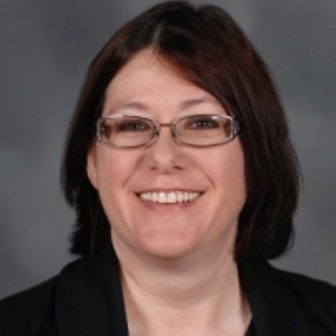 Dr. Molly Merryman fought for an LGBTQ student center at Kent State University.
Dr. Molly Merryman fought for an LGBTQ student center at Kent State University.
SAN FRANCISCO—While serving on a search committee for a new vice president for diversity and inclusion at Kent State University, Dr. Molly Merryman began inquiring about the absence of campus space set aside for gay and lesbian students. After all, students of color already had designated spaces and centers.
Before long, a university official offered Merryman an unused room for an LGBTQ student center that was established in 2010.
“We agreed that I would find a way to staff the center and allow the new vice president to take credit for it as her first new initiative,” Merryman said. “By gifting the center to this vice president, we utilized the existing transition at Kent State to get something important done.”
Merryman’s remarks came last week during the annual summer institute, “Expanding the Circle: Creating an Inclusive Environment in Higher Education for LGBTQ Students and Studies.” Educators from more than 60 colleges and universities nationally attended the event, held at the California Institute of Integral Studies, a stand-alone graduate school offering comparative and cross-cultural studies in philosophy, cultural anthropology, health and other disciplines.
The institute offers educators an opportunity to share best practices and initiatives across academic and student affairs, across various diversities and across various disciplines and LGBT subfields. Institute participants include academic deans and administrators, faculty and faculty development specialists, student life professionals and campus counselors.
Merryman, a Kent State associate professor of sociology, co-led a session titled “Developing and Expanding LGBTQ Courses, Concentrations and Programs.” Although academics were the focus of the day-long session, the dialogue among participants sometimes turned to student life and co-curricular activities.
For instance, one attendee described how he and others at his institution were trying to launch an LGBT study abroad program. It included a service-learning component through which a U.S. student would defray his or her overseas costs by working for advocacy groups and agencies in the foreign country while attending school.
Dr. Kenneth Valente, director of LGBTQ studies at Colgate University who co-led the session with Merryman, said his counterparts in other academic areas are increasingly reporting that their faculty job candidates are expressing interest in gay studies in addition to the field they specialize in.
“We might eventually leverage that interest into some joint faculty appointments,” said Valente, who is also a professor of mathematics at Colgate.
Valente, who teaches three math courses every year alongside two LGBTQ courses, noted that some challenges were unavoidable “because, with two distinct disciplines, everyone expects you to be available all the time.”
Merryman, who in 2001 co-founded the first LGBT studies program in the state of Ohio, encouraged academicians to partner with university fundraisers to cultivate donors in LGBT communities. One of the Kent State development officers, said Merryman, is openly gay and has worked closely with her to close gifts from individuals.
“Some donors are retired and want to support programming that wasn’t at Kent State when they attended long ago,” Merryman said.
Occasionally, benefactors appear unexpectedly. Merryman recounted how the wealthy proprietor of a smoke and porn shop near the University of Akron—about nine miles from Kent State—found himself in cross-hairs with UA officials.
“They felt his store was blight and pushed him out,” she said. “He turned to us and set up a gift.”
Merryman, Valente and conference-goers shared the rationales they have used to seek program approval from senior administrators. They include, for instance, social justice, advancing fields of study, providing intellectual homes for faculty and preparing students for off-campus realities.
In another session at the institute, titled “Navigating LGBTQ Issues & Social Justice: From Microaggressions to Larger Dynamics of Difference,” Dr. Jamie Washington explained to educators how intergenerational conversations and the creation of new campus offices are part of an ongoing process to make university constituents more aware of and sensitive to gay issues.
Washington—currently president of the Washington Consulting Group after spending more than 20 years at the University of Maryland, Baltimore County—emphasized that the context of a conversation about LGBTQ inclusion often takes priority over content. For example, the age, race and socioeconomic class of each person in the conversation ought to be taken into account. He also alluded to the fact that his session occurred only a few hours after the U.S. Supreme Court handed down landmark decisions granting same-sex married couples the same federal benefits given to heterosexual couples, as well as allowing legally-recognized, same-sex weddings to resume in the state of California, where ceremonies started taking place last Friday.
“We have a powerful contextual moment,” Washington said, “at an exciting moment in time.”





















